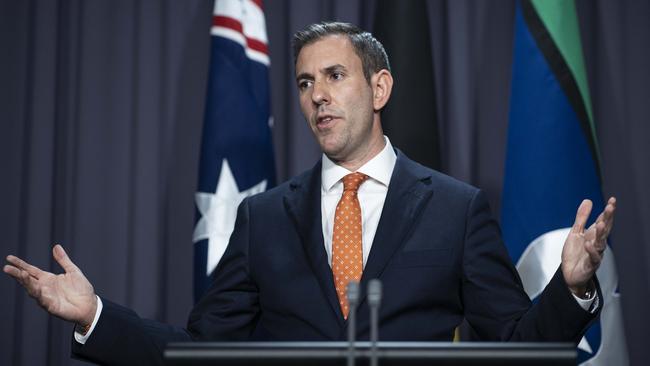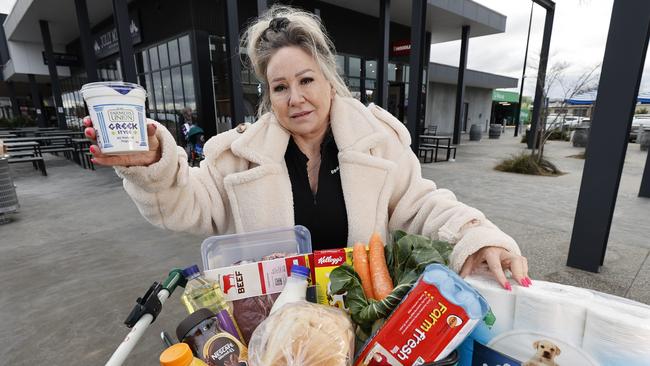‘Confronting’ inflation numbers will worsen before improving, Treasurer Jim Chalmers says
Shocking new forecasts show Australia’s inflation is expected to soar towards eight per cent, but there’s a small glimmer of hope for workers.
Victoria
Don't miss out on the headlines from Victoria. Followed categories will be added to My News.
Wages are set to grow at the fastest pace in a decade over the next two years — but workers will still be going backwards as the cost of living soars by an alarming 7.75 per cent.
But while economic growth is tipped to slow as the unemployment rate climbs, Jim Chalmers is adamant Australia is not on track for a recession.
The Treasurer delivered a gloomy economic update on Thursday, saying there was “no use tiptoeing around the pressure that people are under”.
“This is about giving you the best sense we can of what is really going on,” Dr Chalmers told parliament.
Wages are expected to increase by 3.75 per cent this year and next year, according to Treasury forecasts, although Dr Chalmers said he was “careful, cautious and conscious of the history” of dodgy predictions.

But inflation — which reached a 21-year high of 6.1 per cent on Wednesday — is now tipped to peak at 7.75 per cent by the end of the year. It will take until 2024 to return to normal.
“We haven’t reached the peak yet, but we can see it from here … Inflation will unwind again, but not in an instant,” Dr Chalmers said.
“The harsh truth is households won’t feel the benefits of higher wages while inflation eats up wage increases, and then some.”
Dr Chalmers said that while the government had “grave fears for the global economy”, a recession was not on the cards in Australia.
“The Australian economy is growing — but so are the challenges,” he said.
The Treasurer will wait until October’s budget to detail how the economic challenges will impact Australia’s coffers, although he revealed government payments were now expected to be $30bn higher over four years.
He also said interest payments on Australia’s debt bill — which is heading towards $1 trillion — would be the fastest growing area of government spending, even above aged care, health and the National Disability Insurance Scheme.
“The budget we inherited is bursting with waste and rorts, booby-trapped by expiring measures, and burdened by long-term demographic challenges that come with critical and necessary spending,” Dr Chalmers said.
Opposition treasury spokesman Angus Taylor accused him of being “heavy on politics, heavy on excuses and short on a plan”.
“We’re not suggesting that Labor can change those global circumstances because they can’t, but they can put the national interest first … ahead of pet projects, ahead of ideological fixations and ahead of vested interests,” he said.
Worse to come in ‘confronting’ cost of living crisis
The cost of household staples has skyrocketed in Melbourne by as much as 14.8 per cent, driving the cost of living to a 21-year high and meaning more interest rate hikes are on the way.
The latest inflation data shows that compared to a year ago, Melbourne families are now paying an extra 14.8 per cent for vegetables, 8.5 per cent for beef, 9.4 per cent for coffee and tea and 10.5 per cent for tissues and toilet paper.
Jim Chalmers said the “confronting” inflation numbers would worsen before improving, as he admitted it was not “credible in the near-term” for him to promise pay rises would keep up.
The Treasurer said the “cost of living crisis” meant some vulnerable Australians were now having to choose between paying for vegetables or their rent.

And the Australian Food and Grocery Council said there was even more pain on the way, with chief executive Tanya Barden saying she was surprised the inflation rate was not higher.
On Thursday, Dr Chalmers will unveil a gloomy new economic forecast, with growth predictions slashed by 1.5 per cent over the next three years.
It follows the International Monetary Fund downgrading its forecasts, which Dr Chalmers said showed the global economy was “treading a precarious and perilous path”.
“Inflation will unwind again, but not in an instant. Just as the domestic forces contributing to some of the supply side pressures have been building for the best part of a decade, it will take some time for them to dissipate — but they will,” he will tell parliament.
“In the meantime, higher interest rates combined with the global slowdown … will impact on Australia’s economic growth.”
Ms Barden said families faced further pain on supermarket shelves over the next 18 months.
“Everything to do with making and distributing food and grocery products has gone up significantly in price … and unfortunately, I don’t think we’ve hit the peak of that yet,” she said.
While annual inflation hit 6.1 per cent, after a 1.8 per cent rise in the three months to June 30, the cost of household essentials soared 7.6 per cent across the year.
The biggest contributors to the spike were a 5.6 per cent rise in the price of building new homes and a 4.2 per cent increase in fuel costs, according to the Australian Bureau of Statistics.
Petrol prices are also set to rise again in September as Dr Chalmers rejected calls to extend the fuel excise cut. He instead blasted service stations which did not immediately pass on falling global prices.
“Australians are filthy about that and they should be … The companies shouldn’t treat Australian motorists as mugs,” he said.
Australian Chamber of Commerce and Industry boss Andrew McKellar said it was an “alarming new peak” in inflation.
“The reality is businesses are absorbing cost increases where they can. But, with inflation continuing to sting employers, higher consumer prices will persist in the months ahead,” he said.
Australian Council of Trade Unions president Michele O’Neil warned that meant wages needed to rise urgently as Australians could “barely afford the necessities”.
While Dr Chalmers said real wage increases were unlikely in coming months, he vowed the government would deliver on that commitment within the next three years.
AUSVEG chair Bill Bulmer, a Gippsland vegetable farmer, said consumers would have to get used to paying “that little bit more” to avoid the importation of frozen products “across the board”.
He said cost pressures on growers had been accumulating for years, with lots of businesses barely “hanging in there”.
“We don‘t want to get to the stage where our shelves are bare of fresh produce at certain times of the year and we’re relying on imported products,” Mr Bulmer said.
“We don‘t want people paying $6 or $8 for a lettuce but people might have to get used to paying $3 or $3.50 for lettuce.”
Originally published as ‘Confronting’ inflation numbers will worsen before improving, Treasurer Jim Chalmers says





